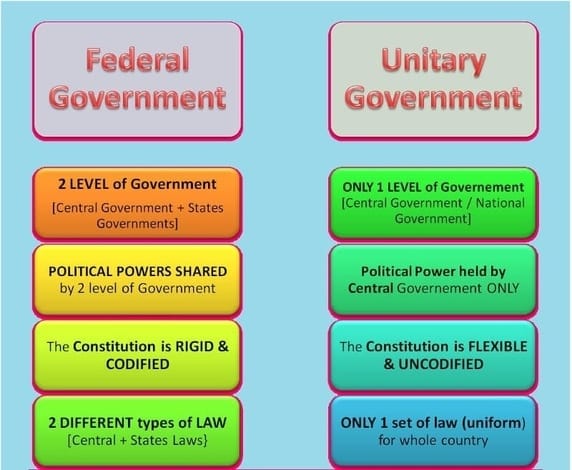Explain the Difference Between a Federal and a Unitary Constitution
In the unitary state the central government plays the role of ultimate authority. In a federal form of government the central government shares its powers with the various constituent units of the country.
Difference Between Unitary Government And Federal Government Difference Between
This article attempts to highlight the differences between federal and unitary governments.

. Smith In light of the way devolution to the UK nations has developed since 1998 the UK can no longer sustain being a unitary state and should become a federal state. A constitution can be either unitary or federal. The federal government takes decisions about policies and has a mechanism for the implementation of.
Explain the Difference Between a Federal and a Unitary Constitution. Concisely explain the difference between federal and unitary states with reference to the UK constitution. For example in India power is divided between the government at the Centre and the various State governments.
Unitary and Federal A unitary constitution is one in which the central government of the. The Indian constitution provides for dual system of government consisting of a federal or union government and a number of state governments and distributes powers between both the governments. Federalism is marked by a sharing of power between the central government and state provincial or local governing bodies.
Constitution of Britain The operation of a constitution shows that what really gives it rigidity or flexibility is attributed to political and psychological factors such as the temperament and character of those operating the constitution concerned. In a unitary form of government all the power is exercised by only one government. The United States is one example of a federalist republic.
Under a unitary constitution such as the United Kingdoms decision-making power is centralised in one authority such as the Westminster parliament. For example in India power is divided between the government at the Centre and the various State governments. What are the main differences between federal unitary and confederal systems.
Federal system is a very centralized form of government where the federal or central government has a high degree of authority. Constitution grants specific powers to the national government while retaining other powers for the states. Analyze the development of the law governing devolution to some of the UK nations discussing at least two of Scotland Wales and Northern Ireland.
A confederal form of government in one in which virtually all political power rests with the individual states and very little with the centralnational government. Supremacy of the constitution. Further the constitution is supreme and both the governments desire their powers from it.
That the national government decides how much power passes to the lower levels of government. Explain the difference between federal and unitary states with reference November 9 2021 by A. A unitary form of government is one in which political power rests with one centralnational government.
Typically a federal state has a constitution or other supreme law of the land that outlines the powers granted to both the central and local governments. In a federal system a national government and the state governments share power. In federalism countries the authority.
While in the federal form there is one central government and separate governments in the provincesii In the federal form of government the whole country is divided into some political units but in the unitary form the whole country is a single unitiii In the unitary form all the. In a unitary system all power lies with the national government whereas in a confederation the vast majority of power rests with the states. A unitary system is governed.
In a federal form of government the central government shares its powers with the various constituent units of the country. In a federal form of government the central government shares its powers with the various constituent units of the country. In Unitary Constitution the provinces are subordinate to the centre but in federal constitution there is a division of powers between the federal and the state governments.
In a unitary form of government all the power is exercised by only one government. Following are the basic differences between federal and unitary government. It is clear division of responsibility and accountability as a unitary state the relationship between central and local governments one of the characteristics.
Both are independent in their own sphere. Dual system of Government. In a unitary form of government all the power is exercised by only one government.
For example in India power is divided between the government at the Centre and the various State governments. I In the unitary form of government there is only one central government for the whole country. In unitary government system powers remained at central place and central government have the authority to make all the decision while in federal government most of the powers except powers related to international affairs are delegated to local governments or provinces.
In a unitary government the power is held by one central authority but in a federal government the power is divided between national government or federal government and local governments or states government. Under a federal constitution such as the United States quasi-autonomous states are delegated substantial powers to resolve issues in their own ways with. A unitary state keeps all power under the control of the central government while a federal state splits power between central authorities and local or regional governments.

Unitary And Federal Government Political Systems
Difference Between Unitary Government And Federal Government Difference Between

No comments for "Explain the Difference Between a Federal and a Unitary Constitution"
Post a Comment